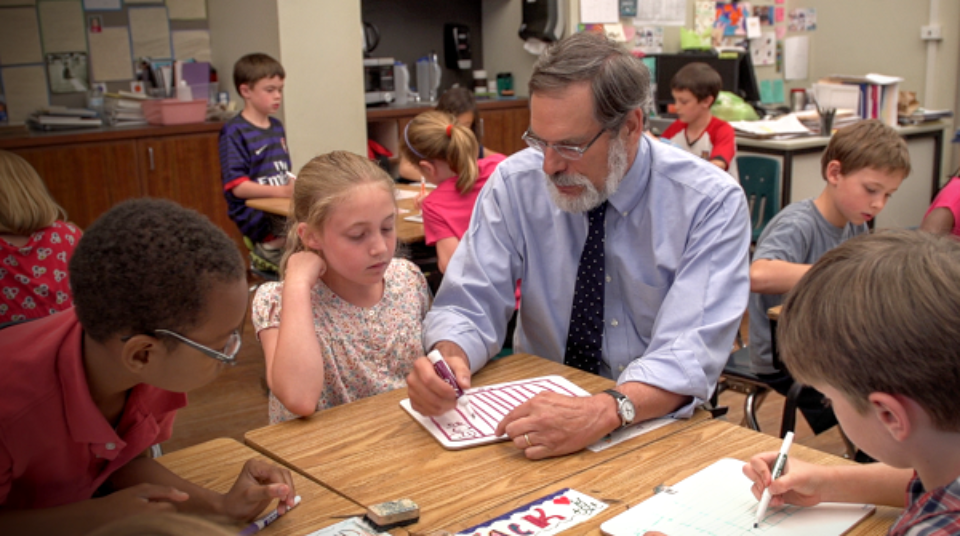
“As an administrator, I can't just talk about the instruction; I've got to model it. I think there's too much coaching from the back of the room.” —Steve Leinwand
If you’ve ever heard Steve Leinwand speak, you know he is energetic and opinionated. More importantly, he is fiercely devoted to the best possible mathematics instruction for all students. His two books, Accessible Mathematics and Sensible Mathematics, are bold and practical guides for shifting how we teach math in all grades. In the second of a two-part interview, we spoke with Steve about research trends, supporting teachers through coaching, and how to ensure students develop mathematical understanding.
If you missed the first part of this interview, click here to read it now.
What are some of the important trends in research today related to teaching and learning math?
Steve Leinwand: I think there are three biggies. Number one: fluency is not instantaneous recall, fluency is not memorization. Fluency is reasonably quick understanding based on conceptual understanding. The whole notion of fluency based on understanding means it's not about practice, practice, practice, or memorization. It's about strategies and understanding. The research is pretty clear on that and I think that's a really powerful trend.
The second one is that distributed practice is a far more effective and powerful way to support and maintain learning and understanding. I think we need to do far more ongoing cumulative review and we need to distribute the practice as opposed to the way it's now clumped. The things you practice and supposedly learn in September often never get seen again and every teacher knows that it’s mostly forgotten by November if it's not maintained. The idea of distributed practice being able to continuously review and build that kind of fluency with understanding is key.
The third piece is blended learning. We have so much that's now available online and it’s really increasing daily in its quality. It’s not a flipped class that appeals to me—I haven't seen any research that says just doing the same thing at home that we used to do in the classroom and in the classroom that we used to do at home is more effective. Instead, the idea of blended learning saying that at home and in the classroom, there are opportunities for both online and not online, online and pencil and paper. It’s a balancing act. I think the notion of blended learning allows us to use technology powerfully both in class and outside of class. There are times and places for both of those approaches.
As an administrator, how can you most effectively coach a teacher who’s not as confident teaching math? What are some starting points for improving their confidence and effectiveness as a math teacher?
SL: It seems to me that there are three aspects to effective coaching: there is a pre-lesson discussion, there is co-teaching, and there is a post-lesson debrief. For somebody who is much more comfortable being an elementary reading teacher, for example, than an elementary math teacher, our pre-lesson discussion can’t be an inquisition. It’s a collegial discussion that starts with, “So what's your goal? What are you trying to accomplish today? Let's clarify that.” And then there’s the question of, “What tasks and activities are you going to do that are going to support that goal?” It’s a wonderfully supportive and non-critical discussion about the elements of clear learning goals and quality tasks that support good math instruction.
Next, as an administrator, I can't just talk about the instruction; I've got to model it. I think there's too much coaching from the back of the room. I think there's way too much coaching that's observation and then quiet side comments. I think that a coach ought to be a co-teacher. We help people become confident when we solve problems together because when you do it together, you build this sense of, “We're in this together!” You stumble together, you laugh together, and suddenly there's a bond about how hard this is to do.
When we co-teach and work a lesson out together, we now have incredible material for a really powerful post-lesson discussion that starts with, “What was cool? What worked? What was exciting? What are you proudest of? What did you do? What did you see me do that really worked?” We’re then able to follow up more naturally with, “So what could be done differently? What did I do that you didn't do? What is it that I did that didn't work?” And then every one of those coaching times needs to end with a doable one or two item action plan. It's just impossible to have someone keep track of five or six things, so you just choose the things that really need to be done. That process conducting that kind of approach to coaching every other week is, I think, how you coach effectively. It lets you build the kind of positive relationships where the kids have no sense that you're a coach; they just know you're a co-teacher—and as the teacher, you don't feel like it's somebody snooping around but it's somebody who has your and your kids’ best interests at heart.
How can teachers help ensure that students leave their classrooms with an authentic understanding of math?
SL: Look at the eight mathematical teaching practices listed in Principles to Actions. We’ve talked about learning goal and tasks. We’ve talked in a general sense about coaching. We've talked about discourse, questions, and the notion of productive struggle. The last of those teaching practices is gathering evidence. I think the answer to the question about ensuring that students have an authentic understanding is every class needs to end with a one minute, “What did you learn today?” and then three to four minutes for an exit slip. It's formative assessment that is most critical, and this idea is supported by all the research. I can also tell you that in the 170 math classes I observed during the 2014-15 school year, I saw formative assessment in seven classes. Seven classes! I saw a teacher begin the class with the phrase, “What was on yesterday's exit slip?” two times! That means it's not happening—and I went to a fairly broad, random sample of classes. So when we conveniently run out of time for something like this, I wonder if we just don’t want to know what the results would have been. There needs to be a real push for this kind of assessment because if a class ends without the kids being able to demonstrate what they've learned then it was probably a substandard lesson.
Click here to read Steve's best online math resource suggestions.
♦ ♦ ♦ ♦
 Steve Leinwand is the author of the bestselling Heinemann titles Accessible Mathematics: Ten Instructional Shifts That Raise Student Achievement and Sensible Mathematics: A Guide for School Leaders in the Era of Common Core State Standards. He is Principal Research Analyst at American Institutes for Research in Washington, D.C., where he supports a range of mathematics education initiatives and research. Steve served as Mathematics Supervisor in the Connecticut Department of Education for twenty-two years and is a former president of the National Council of Supervisors of Mathematics. Follow him on Twitter @steve_leinwand.
Steve Leinwand is the author of the bestselling Heinemann titles Accessible Mathematics: Ten Instructional Shifts That Raise Student Achievement and Sensible Mathematics: A Guide for School Leaders in the Era of Common Core State Standards. He is Principal Research Analyst at American Institutes for Research in Washington, D.C., where he supports a range of mathematics education initiatives and research. Steve served as Mathematics Supervisor in the Connecticut Department of Education for twenty-two years and is a former president of the National Council of Supervisors of Mathematics. Follow him on Twitter @steve_leinwand.


